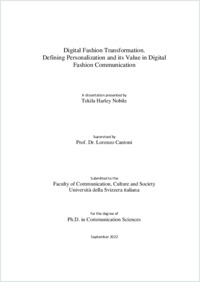Digital fashion transformation : defining personalization and its value in digital fashion communication
- Nobile, Tekila Harley
- Cantoni, Lorenzo (Degree supervisor)
- 2022
PhD: Università della Svizzera italiana
Fashion
Digital transformation
Digital fashion communication
Personalization
Perceived personalization
Customization
Personalization value
English
Fashion is being impacted by a rapid digital transformation, which is not occurring in isolation, instead it is pervasive, disrupting its value chain at an unprecedented speed. This is raising compelling questions regarding the ways in which fashion is evolving. In such context, personalization, driven by digital advances, occupies a dominating position, attracting the interest of both researchers and practitioners. The predominant narrative is that personalization represents an opportunity to create value by building strong personal relationships between firms and consumers. However, personalization remains shadowed by unrefined definitions. Furthermore, while a stream of research supports its expected benefits, another stream questions its value, making personalization a controversial topic. Hence, although widely studied, its understanding remains a desideratum, lacking clarity regarding its construct and its value. This cumulative thesis investigates how the digital transformation is impacting fashion and creating value through personalization. To this end, it adopts both quantitative and qualitative research methods, allowing to study how the digital transformation is impacting fashion, what is personalization, measure and identify if, when, to what extent, and under which conditions personalization provides value to fashion stakeholders. The results are presented through eight studies, framed by the Online Communication Model (Cantoni and Tardini, 2006). The first three studies present the ways in which fashion is being impacted by the digital transformation (fifth element). In this digitally transforming fashion context, the focus is then narrowed to personalization. Three studies provide an in-depth understanding of personalization construct by developing a comprehensive definition and by showing how it is enacted by fashion firms through newsletters (pillars I and II), a crucial contribution to its theoretical advancement. Subsequently, through two studies it shows how personalization creates value by building a bridge between a firm (pillar III) and a consumer perspective (pillar IV). By not only measuring through experiments but also delving deep into the motivations of personalization (in)effectiveness, this thesis makes contributions that transcend the latest digital advances. The thesis findings provide also managerial implications by offering insights on how to develop and implement effective personalized communications that provide value to fashion stakeholders.
- Collections
- Language
-
- English
- Classification
- Social sciences
- License
-
License undefined
- Open access status
- green
- Identifiers
-
- NDP-USI 2022COM008
- URN urn:nbn:ch:rero-006-121500
- ARK ark:/12658/srd1322811
- Persistent URL
- https://n2t.net/ark:/12658/srd1322811
Statistics
Document views: 390
File downloads:
- 2022COM008: 3163
